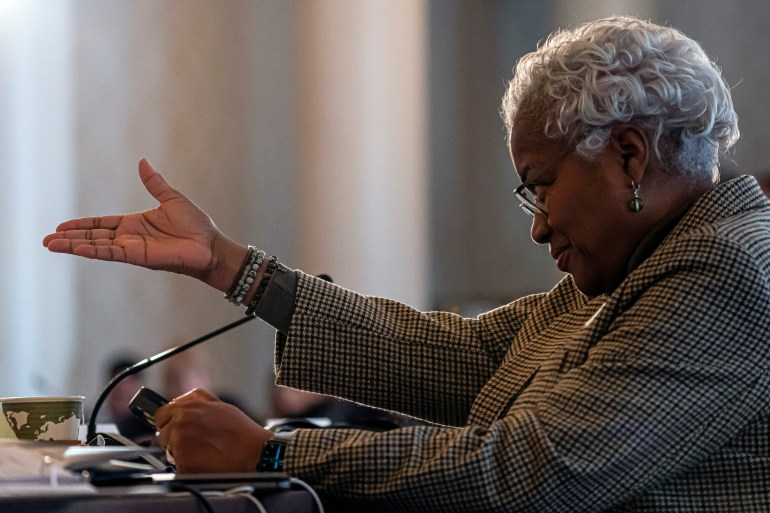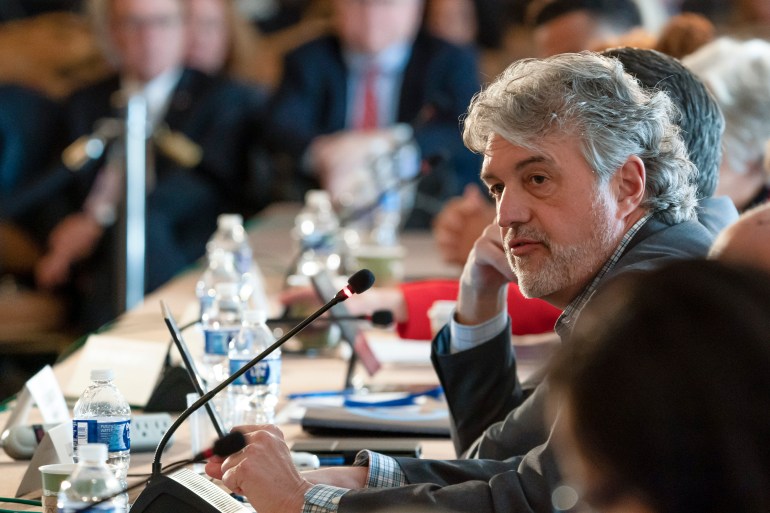Democrats vote to shake up 2024 presidential nomination process | Elections News
In a move that upends nearly 50 years of tradition, members of the Democratic National Committee (DNC) — which oversees one of the two major political parties in the United States — have voted to reshuffle their primary calendar for the 2024 presidential race.
South Carolina is now set to open the nominating schedule, followed by votes in New Hampshire and Nevada a week later.
The decision is slated to bump the Midwestern state of Iowa from the top spot: Since 1972, Iowa has kicked off the presidential nomination process with its first-in-the-nation caucuses.
While the shake-up is expected to be confirmed by the full DNC in a vote early next year, the move, announced on Friday, signals a power shift in US politics, as Democrats focus on building a more diverse voter base.
In the US, presidential nominees for the Republican and Democratic parties are determined through a series of state-by-state primary elections and caucuses. States that vote before Super Tuesday — the day when the greatest number of states hold their primaries — are thought to influence the outcome of each party’s nomination.
Friday’s decision comes in the wake of a letter issued by US President Joe Biden calling on the DNC to abandon “restrictive and anti-worker” caucuses that require voters to appear in person at “a set location at a set time” to participate.
Biden’s letter — written on personal stationary, rather than White House’s — also emphasised the need to prioritise Black voters in the party’s presidential selection process.
“For decades, Black voters in particular have been the backbone of the Democratic Party but have been pushed to the back of the early primary process,” Biden wrote.
“We rely on these voters in elections but have not recognized their importance in our nominating calendar. It is time to stop taking these voters for granted, and time to give them a louder and earlier voice in the process.”
Black voters in South Carolina are credited with helping to keep Biden’s presidential ambitions alive in a close primary race in 2020. Early votes in Iowa and New Hampshire that year showed Biden trailing in fourth and fifth place, respectively, behind other Democratic hopefuls.
But he scored a commanding victory in South Carolina, helping him to earn the party’s nomination. Over 26 percent of South Carolina residents are Black.
In the general election against Republican incumbent Donald Trump, Biden likewise received strong support from the Black community, receiving 92 percent of the Black vote.
But Democrats have long faced criticism that they have taken Black voters and their issues for granted, a feeling echoed by DNC member Donna Brazile during the panel convened on Friday.
“Do you know what it’s like to live on a dirt road? Do you know what it’s like to try to find running water that is clean?” Brazile asked the rule-making arm of the Democratic Party. “Do you know what it’s like to wait and see if the storm is going to pass you by and your roof is still intact?”

Friday’s vote also elevates the status of primary races in Georgia and Michigan, which are set to round out the first five states that will vote on the Democratic nominee. New Hampshire, Nevada, Georgia and Michigan are all considered crucial battleground states for the Democrats, as Biden prepares to run for a second term in 2024.
Republican-leaning South Carolina, meanwhile, has not voted blue in a general election for president since 1976.
As the incumbent, Biden is considered a shoo-in for his party’s nomination in 2024, meaning Friday’s decision will likely have greater consequences for future presidential elections.
The Republican National Committee (RNC), meanwhile, has stated its intention to continue using the Iowa caucus as its first primary race in 2024. Among the candidates expected to run are former President Donald Trump, who announced the launch of his campaign in November.
Iowa Republicans blasted the DNC’s primary reshuffle, calling the decision to make South Carolina the party’s first primary state “an unserious alternative from an unserious president”.
“The DNC and Joe Biden have just kicked off utter chaos,” Iowa Republican Party Chairman Jeff Kaufmann said in a statement, vowing: “The fight is not over.”

Iowa’s Scott Brennan, a Democratic rules committee member, also called on his fellow party members to ensure “small, rural states” have a voice in the Democratic nomination process.
“Democrats cannot forget about entire groups of voters in the heart of the Midwest without doing significant damage to the party in newer generations,” he told the panel on Friday. Brennan and other committee members from Iowa and New Hampshire were the only votes against Friday’s change to the Democratic nomination schedule.
Iowa suffered days-long delays and inconsistencies in its 2020 Democratic caucus race, leading candidates like Bernie Sanders and Pete Buttigieg to request a recanvassing of some precincts.
Democratic committee members from Nevada also criticised Friday’s new nomination schedule, which has their state voting second on a shared date with New Hampshire.
“If we want to build a strong relationship with Latinos,” Nevada’s Artie Blanco said, “then Nevada must stand alone on a date and not have to share that date.” Close to 30 percent of Nevada’s population identifies as Latino, according to the 2021 census.
Iowa and New Hampshire have said laws in their states mandate them going before others, and they intend to abide by those, not the committee’s decision.

Pingback: sci diyalaa
Pingback: other
Pingback: Aviator game online